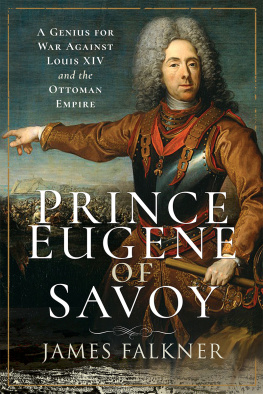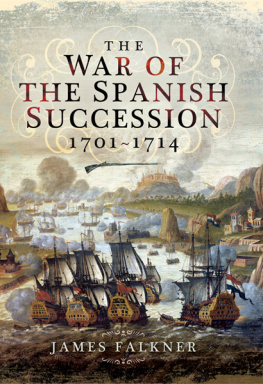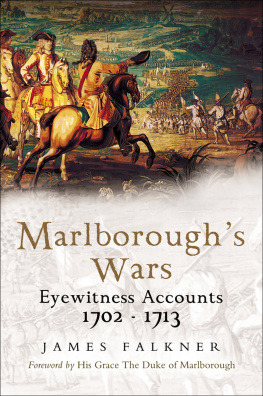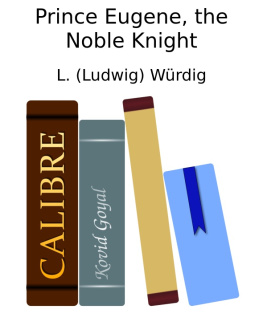James Falkner - Prince Eugene of Savoy
Here you can read online James Falkner - Prince Eugene of Savoy full text of the book (entire story) in english for free. Download pdf and epub, get meaning, cover and reviews about this ebook. year: 2022, publisher: Pen and Sword, genre: Non-fiction. Description of the work, (preface) as well as reviews are available. Best literature library LitArk.com created for fans of good reading and offers a wide selection of genres:
Romance novel
Science fiction
Adventure
Detective
Science
History
Home and family
Prose
Art
Politics
Computer
Non-fiction
Religion
Business
Children
Humor
Choose a favorite category and find really read worthwhile books. Enjoy immersion in the world of imagination, feel the emotions of the characters or learn something new for yourself, make an fascinating discovery.
- Book:Prince Eugene of Savoy
- Author:
- Publisher:Pen and Sword
- Genre:
- Year:2022
- Rating:4 / 5
- Favourites:Add to favourites
- Your mark:
- 80
- 1
- 2
- 3
- 4
- 5
Prince Eugene of Savoy: summary, description and annotation
We offer to read an annotation, description, summary or preface (depends on what the author of the book "Prince Eugene of Savoy" wrote himself). If you haven't found the necessary information about the book — write in the comments, we will try to find it.
Prince Eugene of Savoy — read online for free the complete book (whole text) full work
Below is the text of the book, divided by pages. System saving the place of the last page read, allows you to conveniently read the book "Prince Eugene of Savoy" online for free, without having to search again every time where you left off. Put a bookmark, and you can go to the page where you finished reading at any time.
Font size:
Interval:
Bookmark:

A Genius for War Against Louis XIV and the Ottoman Empire
James Falkner
Now, Murmur Tales of Iron Wars

First published in Great Britain in 2022 by
PEN & SWORD MILITARY
An imprint of
Pen & Sword Books Ltd
Yorkshire Philadelphia
Copyright James Falkner, 2022
ISBN 978 1 52675 353 3
The right of James Falkner to be identified as Author of this work has been asserted by him in accordance with the Copyright, Designs and Patents Act 1988.
A CIP catalogue record for this book is available from the British Library
All rights reserved. No part of this book may be reproduced or transmitted in any form or by any means, electronic or mechanical including photocopying, recording or by any information storage and retrieval system, without permission from the Publisher in writing.
Pen & Sword Books Ltd incorporates the imprints of Pen & Sword Archaeology, Atlas, Aviation, Battleground, Discovery, Family History, History, Maritime, Military, Naval, Politics, Social History, Transport, True Crime, Claymore Press, Frontline Books, Praetorian Press, Seaforth Publishing and White Owl
For a complete list of Pen & Sword titles please contact
PEN & SWORD BOOKS LTD
47 Church Street, Barnsley, South Yorkshire, S70 2AS, England
E-mail:
Website: www.pen-and-sword.co.uk
Or
PEN AND SWORD BOOKS
1950 Lawrence Rd, Havertown, PA 19083, USA
E-mail:
Website: www.penandswordbooks.com
Eugenes Campaigns against the Ottomans
Eugenes Campaigns in Italy
The Battle of Zenta, 11 September 1697
The Movements of the Armies prior to the Battle of Blenheim
The Battle of Blenheim, 13 August 1704
The Battle of Cassano, 16 August 1705
Eugenes March to Save Turin, 1706
The French Siege Works outside Turin, 1706
The March by Eugene and Duke Victor-Amadeus to Attack Toulon, 1707
The Battle of Oudenarde, 11 July 1708
The Battle of Malplaquet, 11 September 1709
The Manouevres before Denain, 1712
Frances Defences on the Rhine
Europe in 1713
The Ottoman Empire, and the Habsburg Empire in the East
B&W Plates
Prince Eugene of Savoy, c. 1700. Imperial field commander and President of the War Council in Vienna.
Duke Victor-Amadeus of Savoy.
Eugenes mother Olympia Mancini, Countess de Soissons, c. 1670.
Emperor Leopold of Austria, c. 1680.
Turken Louis: Louis-Guillaume, Margrave of Baden, sponsor and supporter of the young Eugene.
Count Ernst Rdiger von Starhemberg, staunch defender of Vienna in 1683.
Field Marshal Guido von Starhemberg, a close colleague of Eugene, who later became a severe critic.
The fortress of Belgrade, viewed from across the Danube.
Emperor Joseph I, a great supporter of Eugene.
Emperor Charles VI of Austria, Habsburg claimant to the throne of Spain.
Nicholas de Catinat, Marshal of France.
Franois de Neufville, Duc de Villeroi, Marshal of France.
Louis-Joseph de Bourbon, Duc de Vendme.
Louis-Franois, Duc de Boufflers, Marshal of France.
Claude-Louis-Hector de Villars, Marshal of France.
Grand Vizier Kara Mustapha, Ottoman commander defeated at Vienna in 1683.
Grfin Elenore Batthyny, close friend of Eugene.
An Ottoman janissary.
The Htel de Soissons, where Eugene was born.
Eugenes Winterhof Palace in Vienna, where he died.
Colour Plates
Prince Eugene of Savoy c. 1730.
The Austrian siege of Buda (Ofen), 1686.
The Second Battle of Mohacs, 12 August 1687.
A battle for a river crossing in Hungary, c. 1690.
Eugene at the battle for Belgrade, 16 August 1717.
Belgrade, the Ottoman White Castle, before its capture by Eugene.
Ottoman sipahi regular cavalry, c. 1700.
Louis XIV, c. 1680, about the time he refused Eugene a commission in his army.
John Churchill, 1st Duke of Marlborough with his Chief of Engineers Colonel John Richards.
Max-Emmanuel Wittelsbach, Elector of Bavaria.
James FitzJames, Duke of Berwick, Marshal of France.
The sack of Buda by Austrian troops, 1686.
Austrian field officer and soldiers, c. 1700.
A contemporary cartoon portrait of Prince Eugene.
The magnificent equestrian statute of Prince Eugene standing in the centre of Vienna bears the stirring inscription To the glorious conqueror of Austrias enemies. True enough, but in his youth Eugene had been intended by the Sun King, Louis XIV of France, for a career in the Church. This was against his nature and inclination, and so the young adventurer fled to Austria to offer his services, and his unbloodied sword, to the Habsburg emperor, Leopold I. At the time a formidable army, sent by the sultan in Constantinople, was at the gates of Vienna, and the safe deliverance of the city in the summer of 1683, and the repulse of what had every appearance of a major Ottoman incursion into central Europe, was an extraordinary feat of arms. The young exile played a gallant part in the drama, attracting favourable attention and setting himself firmly on the way to renown. Eugene proved to have a naturally aggressive talent for soldiering, and in the years that followed he campaigned hard and although an outsider rose rapidly in rank, scoring significant military successes, most notably the astonishing victory in 1697 over the Ottoman army at Zenta on the river Tisza in Hungary.
By the onset of the long war for the throne of Spain just four years later, Eugene ranked as Emperor Leopolds foremost military commander. He was appointed as President of the Imperial War Council, the Hofkriegsrat , and in this role formed a renowned partnership, and a lasting friendship, with Queen Annes Captain-General, John Churchill, 1st Duke of Marlborough. The Englishman famously brought his army to the Danube to share with Eugene the victory over the French and Bavarians at the Battle of Blenheim (Hchstdt) in August 1704. The military and political shape of Europe changed forever that day, and the two comrades continued to work in close harmony throughout the hard years of campaigning that led to the weary peace achieved at the Treaties of Utrecht, Rastadt and Baden in 1713 and 1714. Although arguing his point from a position of relative weakness, Eugenes persuasive participation in the complex negotiations to bring about this long-overdue peace was significant, and widely acknowledged.
Eugene was a prince in his own right, being a member of the junior branch of the ruling noble house of Savoy, with a natural, perhaps almost brash, self-confidence that stood him in good stead through long years of demanding service to three successive Habsburg emperors. Perhaps understandably it is his famous partnership with Marlborough for which he is best known in Western Europe, and particularly so to the British reader, but this is to see only half of the picture. Eugenes daring march to Turin in the high summer of 1706, moving unchecked around the flank of a large French army to go to the relief of his beleaguered cousin, Duke Victor-Amadeus II of Savoy, must rank at least with Marlboroughs famous march to the Danube, and yet then the dukes opponents had largely been in the dark as to his real intentions. Not so with Eugene, as his opponent, that veteran the Duc de Vendme, was aware of his goal, and yet failed utterly to prevent what stands as an almost unique achievement. Demanding campaigns against stubbornly resilient France lay ahead, and resurgent Ottoman power on the wide grassy plains and marshy wastelands of south-eastern Europe would in time have to be confronted again. There, in unforgiving terrain for large-scale military operations and facing formidable opponents, Eugene achieved major victories on an astonishing scale, such as those at Peterwardein in 1716 and the capture of Belgrade in the following year. As with Zenta, Blenheim and Turin, these successes were regarded as simply the wonders of the age and Eugene pre-eminent amongst the military commanders of the day. He drove his men hard, and often recklessly drove himself, but while demanding much and forgiving little, the affection and trust felt by his shabby and ill-equipped soldiers for their strange, unimpressively stooped and singular commander enabled them repeatedly to achieve great things against daunting odds.
Font size:
Interval:
Bookmark:
Similar books «Prince Eugene of Savoy»
Look at similar books to Prince Eugene of Savoy. We have selected literature similar in name and meaning in the hope of providing readers with more options to find new, interesting, not yet read works.
Discussion, reviews of the book Prince Eugene of Savoy and just readers' own opinions. Leave your comments, write what you think about the work, its meaning or the main characters. Specify what exactly you liked and what you didn't like, and why you think so.












